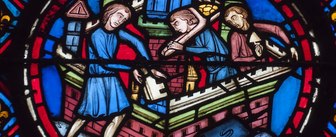The Statue of David, a masterpiece of Renaissance sculpture by the Italian artist Michelangelo depicting the nude body of the biblical figure, is regarded by many as a symbol of strength and independence. However, David recently has stirred controversy among some American parents who oppose their children's schools sharing images of the statue as part of the curriculum. YouGov recently conducted a survey to understand how Americans feel about art education that involves nudity.
Three-quarters (75%) of Americans say they do not find the depiction of nudity in paintings and sculptures by classical artists to be problematic, and only 14% say they do. Opinions on this matter vary by how important Americans say religion is in their lives: 18% of Americans who say religion is somewhat or very important in their lives say they find the depiction of nudity problematic, while only 6% of Americans who say religion is not too important or not at all important say the same. Age also plays a role: Adults under 45 are more likely than older Americans to say the depiction of nudity in art is problematic (21% vs. 7%). Opinions on nudity in classical art differ only slightly based on political identification.
Most Americans also say nudity in classical art is not problematic specifically for children to view: 55% say this — 20 percentage points fewer than say the same when the possibility of children viewing the art isn't mentioned — while 28% say it is problematic. One-third (33%) of Americans who say religion is somewhat or very important to them say nudity in art is problematic for children, compared to 17% of those who say religion is not too important or not at all important. Adults under 45 also are more likely than older Americans to say nudity in classical art is problematic for children (37% vs. 20%). Political identification yielded slightly larger differences for this question than for the question of nudity in classical art generally: Republicans (35%) are more likely than Democrats (27%) and Independents (23%) to say viewing art that contains nudity is problematic for children.
YouGov also asked Americans about the controversy surrounding the statue of David more directly. Three-quarters of Americans (75%) say they are familiar with Michelangelo’s statue, 15% say they are not, and 10% are not sure. Americans were then shown a picture of the statue and asked whether they thought showing the picture in an art class would be appropriate at various levels of education. By 70% to 20%, Americans say showing a picture of the statue to high schoolers would be appropriate. When asked about showing the picture to middle schoolers, Americans were more closely divided, with 48% saying it would be appropriate and 38% saying it would be inappropriate. As for children in elementary school, by 55% to 31%, Americans say it would be inappropriate for them to view a picture of David as part of an art class.
Part of the controversy surrounding the image of David being shown to a class of sixth graders in a Florida school stemmed from parents not being given notice that the photo would be shown in class. Two-thirds of Americans (67%) say parents should be given a notice before their children are shown artwork involving nudity, and just 21% said they should not. Americans who are or have been parents at some point are more likely than other adults to say that parents should be given notice (72% vs. 57%). Republicans (77%) are more likely than Independents (66%) and Democrats (59%) to say that parents should be given notice. Opinions on this did not vary much by age.
Because the recent controversy has led some parents to describe Michelangelo’s sculpture as “pornographic,” YouGov asked Americans if they agree, after being shown the statue. Only 16% of Americans say they would consider David to be pornographic, while 75% say they would not. Similar shares of Republicans (18%), Democrats (16%), and Independents (15%) say they would consider the statue to be pornographic. Adults under 45 are far more likely than older Americans to say they consider the statue to be pornographic (27% vs. 8%). Americans who say religion is somewhat or very important to them are twice as likely as Americans who say religion is not too important or not at all important to them to call David pornographic (20% vs. 10%).
— Linley Sanders contributed to this article
See the results from this YouGov poll
Methodology: This poll was conducted online on March 30 - April 4, 2023 among 1,000 U.S. adult citizens. Respondents were selected from YouGov’s opt-in panel using sample matching. A random sample (stratified by gender, age, race, education, geographic region, and voter registration) was selected from the 2019 American Community Survey. The sample was weighted according to gender, age, race, education, 2020 election turnout and presidential vote, baseline party identification, and current voter registration status. Demographic weighting targets come from the 2019 American Community Survey. Baseline party identification is the respondent’s most recent answer given prior to March 15, 2022, and is weighted to the estimated distribution at that time (33% Democratic, 28% Republican). The margin of error for the overall sample is approximately 3%.
Image: Adobe Stock (TravelFlow)












